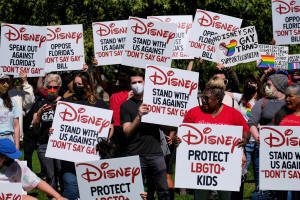How Republican-led states are targeting Wall Street with 'anti-woke'
laws
 Send a link to a friend
Send a link to a friend
 [July 06, 2022]
By Pete Schroeder [July 06, 2022]
By Pete Schroeder
WASHINGTON (Reuters) - Republican-led
states have unleashed a policy push to punish Wall Street for taking
stances on gun control, climate change, diversity and other social
issues, in a warning for companies that have waded in to fractious
social debates.
Abortion rights are poised to be the next frontier.
This year there are at least 44 bills or new laws in 17 conservative-led
states penalizing such company policies, compared with roughly a dozen
such measures in 2021, according to a Reuters analysis of state
legislative agendas, public documents and statements.
While some of the individual moves have been reported, the scale and
speed at which such "anti-woke" state laws and policies are ballooning
and the challenges they are creating for Wall Street companies is
detailed here for the first time.
The Merriam-Webster dictionary defines "woke" as being aware of and
actively attentive to issues of racial and social justice, but it is
often used by conservatives to disparage progressive policies. The term
has gained traction as America has become more politically polarized
over issues from racial justice and LGBTQ rights to the environment and
COVID-19 vaccines.

Reuters counted bills considered and state laws passed in 2021 and 2022,
although some state officials are also using executive powers to punish
Wall Street.
The growing restrictions show how America's culture wars are creating
new risks for some of the most high-profile U.S. companies, forcing them
to balance pressure from workers and investors to take stances on
hot-button issues with potential backlash from conservative
policymakers.
West Virginia and Arkansas this year, for example, stopped using
BlackRock Inc for certain services, due to its climate stance, according
to West Virginia's Republican treasurer Riley Moore and Arkansas media
reports.
In Texas, JPMorgan Chase & Co, Bank of America and Goldman Sachs have
been sidelined from the municipal bond market due to laws passed last
year barring firms that "boycott" energy companies or "discriminate"
against the firearms industry from doing new business with the state.
In many cases, the measures target a range of companies, restricting
their ability to conduct state business. But financial institutions have
been primary targets due to the pivotal roles they play in the economy
and the early stances many took on such issues as fossil fuel and
firearms financing.
Republicans say the policies of such companies deprive legitimate
businesses of capital.
“They're using the power of their capital to push their ideas and
ideology down onto the rest of us," said Moore. He spearheaded a law,
passed in March, refusing business to banks that "boycott" fossil fuel
companies and has rallied officials from 16 other states to promise to
adopt similar policies.
With several major financial companies stepping in to cover travel costs
for employees seeking abortions after the Supreme Court last month
reversed federal abortion rights, the Republican push to sanction Wall
Street for "woke" stances is likely to grow.
Republican Texas lawmaker Briscoe Cain said he plans legislation to
outlaw such coverage and prohibit companies that provide it from
receiving any Texas state business or contracts.

"No corporation doing business in Texas will be allowed to subsidize
abortions or abortion travel in any manner," Cain told Reuters in an
email.
NO BOYCOTTS
The new curbs will make it harder for financial firms to do a range of
state business, from bond underwriting to managing state funds,
depository accounts and government credit cards, according to interviews
with more than a dozen industry sources, bank lobbyists and lawyers.
Such contracts can be worth several million dollars each, public
procurement data shows.
JPMorgan, for example, underwrote $3.2 billion worth of Texas muni bonds
last year, compared with $210 million so far this year, Refinitiv data
shows. Bank of America, which underwrote $3.7 billion in Texas muni
bonds last year, has done none this year.
Some smaller firms, including Ramirez & Co Inc and Loop Capital Markets,
meanwhile, have jumped more than 10 places so far this year in the Texas
muni bond market bookrunner rankings, based on deal values. To be sure,
some Democratic-led states are also looking to tilt the scales.
Washington state floated a "climate resiliency fee" for institutions
that fund fossil fuel projects. California is considering a bill that
would stop its pension plans, the country's largest, from investing in
fossil fuel companies. But states led by Democrats are not pursuing as
many punitive measures, according to the review and sources.
[to top of second column]
|

Disney's employees protest against Florida's "Don't Say Gay" bill,
in Glendale, California, U.S., March 22, 2022. REUTERS/Ringo Chiu

"We're going to see a lot more of these statutes on
one side of the coin or the other," said John Crossley, a partner at
K&L Gates who focuses on energy. "It’s going to make it more and
more difficult for people to operate in these markets."
Spokespeople for the above financial firms declined
to comment or did not respond to requests for comment.
Financial firms say they aim to provide comprehensive healthcare
benefits. They also argue government restrictions will drive up
costs for Americans, and they dispute the characterization of their
policies as boycotts.
BlackRock, the world's largest asset manager and a frequent target
of Republican attacks, for example, has told Texas officials that
while it has joined various efforts to cut greenhouse gas emissions,
it supports fossil fuel companies.
"The economy and financial system are best served when banks of all
sizes can make their own banking and lending decisions about how to
meet the needs of their communities based on their business model
and risk tolerance," said Joseph Pigg, senior vice president at the
American Bankers Association.
ANTI-WOKE PUSH
The review shows "anti-woke" measures are gaining ground not only in
traditional conservative strongholds such as Texas and Kentucky but
also in so-called purple states - whose voters swing Democratic or
Republican - such as Arizona and Ohio.
The issues such measures target are also mushrooming.
Guns and energy were the focus of the roughly dozen state laws and
bills last year and of at least 30 legislative measures this year.
But this year there were also more than a dozen bills relating to
social and other issues, including “divisive concepts” like critical
race theory – an academic theory that racial bias is baked in to
U.S. laws and institutions – mandatory COVID-19 vaccines, or the use
of "social credit scores,” the Reuters analysis shows. The latter is
a theory that companies may take into account an individual’s
political leanings when providing and pricing services. In April,
for example, Florida made it illegal for companies to require
training that might make staff feel "guilt" or "anguish" because of
past actions by members of the same race. Unveiling the bill,
Florida Governor Ron DeSantis flagged Bank of America as one company
conducting such "woke" training. A bank spokesman said the materials
were offered to hundreds of companies by a nonprofit and were not
part of the bank’s training materials.

While the measures reviewed do not target corporate abortion
policies, Cain said he expected other Republican-led states to
pursue business restrictions on companies with such policies.
WALL STREET DIVISIONS
The financial industry is struggling to repel the onslaught, the
sources said. Its trade groups are mainly registered to lobby the
federal government, while state-based groups are not always aligned
with Wall Street companies' priorities. Moore, for example, said
West Virginia's community banks supported his measures. The West
Virginia Bankers Association declined to comment. The Texas Bankers
Association said the group had not opposed the Texas curbs because
its members were not in "consensus."
Wall Street's adversaries, on the other hand, are united.
Galvanized by what they say are efforts by Democrats in the federal
government to push "woke" policies, oil and gas, firearms and
conservative groups, including the Texas Public Policy Foundation
and the National Shooting Sports Foundation (NSSF), are successfully
pushing such curbs, according to industry sources and advocates.
"Banks should stay out of making policy choices," said Lawrence
Keane, general counsel at the NSSF, which advocated for the Texas
law targeting lenders' firearms policies.
The American Petroleum Institute, a major energy group, said it
opposes discriminatory policies toward the industry. Jason Isaac, a
former Texas lawmaker who leads energy advocacy for the Texas Public
Policy Foundation and helped craft the Texas fossil-fuel law, said
he was discussing similar laws with other states, adding: "This woke
political ideology will continue unless we get it in check."
(Reporting by Pete Schroeder in Washington; Additional reporting by
Chris Prentice in Washington and Ross Kerber in Boston; Editing by
Michelle Price, Paritosh Bansal and Matthew Lewis)
[© 2022 Thomson Reuters. All rights
reserved.]
This material may not be published,
broadcast, rewritten or redistributed.
Thompson Reuters is solely responsible for this content.
 |